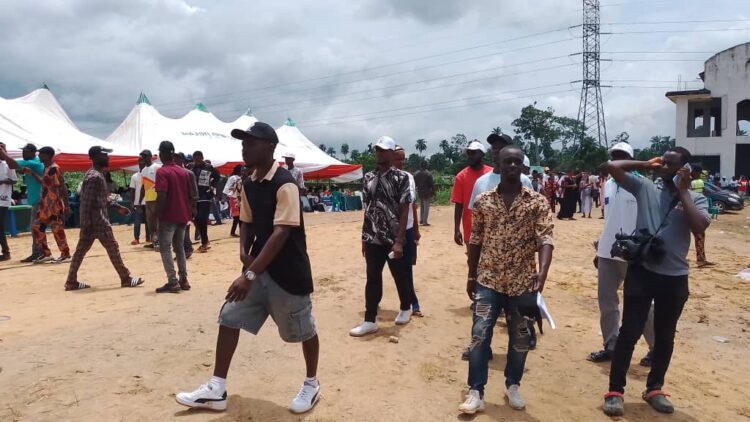By Sunny Awhefeada
A certain character located in intuition defined the Nigerian writer in the first decade of the nation’s independence. All of the major writers of that period, Gabriel Okara, Chinua Achebe, Christopher Okigbo, J. P. Clark and Wole Soyinka, did not share, as depicted in their writings, in the sunny optimism that greeted the attainment of independence. While Nigerians chose to look at the new nation through rose tinted glasses and sang “Nigeria we hail the/Our own dear native land/though tribes and tongues may differ/ in brotherhood we stand…” the writers, novelists, poets and dramatists looked into the crystal ball and what confronted them was the antithesis of what the national anthem offered. What they read in the crystal ball contradicted the grandiose dreams of the nation’s founding fathers. The writers like the Old Testament prophets saw visions of discord and instability. They saw wars and rivers of blood. The writers saw mountains and valleys of obstruction. Each look at the crystal ball revealed a frightening scenario. Did the writers keep quite? No, they didn’t. They committed their tragic visions into writings in poems, plays and novels. What the writers saw manifested quite early in the life of the new nation. Those obstacles, monumental as they are, still confront Nigeria after sixty years of nationhood.
Gabriel Okara’s poem “The Fisherman’s Invocation” recreates the anxiety arising from the uncertainty of trajectory of the new nation. The poem which revolves around the celebration of Nigeria’s independence is not a celebration, but a cautious pointer to the uncertainty that looms. If Okara only poeticized caution, Wole Soyinka’s play A Dance of the Forest is doom foretold for the new nation. Nothing adds up for the “Gathering of the Tribes” which is Nigeria. Failure, hopelessness and tragedy overarched the new community. J. P. Clark’s The Raft having set sail with four lumbermen (the four regions of Nigeria’s First Republic) also runs into different existential crises and each of the lumbermen got destroyed one after the other. Chinua Achebe’s A Man of the People remains tellingly prophetic as the novel which ends with a coup d’ etat came out of the press just a few days before the coup. Irate and drunk soldiers were to storm Achebe’s residence to ask him which was mightier between the gun and the pen. Fortunately for the master storyteller he was not at home. His chi was at work. Christopher Okigbo wrote great poems some of which he subtitled “poems prophesying war”. He wasn’t as lucky as Achebe. He died in the war.
The Nigerian writer’s prediction of the nation’s turbulent destiny remains uncanny. So much has been made of the tendency of the writer as prophet. What Okara anticipated, what Achebe predicted, what Okigbo envisioned, what Clark envisaged and what Soyinka reframed have all become Nigeria’s lot. The many maladies bedeviling our beloved, but abused country are reflected in the diagnosis depicted in the works of these early writers. Their works configure the many crises that now define us. From disunity, to corruption, insecurity, underdevelopment, poverty, crash of values, to the most minutiae of our problems, our writers did come to terms with the tragedy called Nigeria. The dominant gap in the Nigerian writer’s apprehension of our collective predicament has been the lack of a redemptive praxis. Although, the writers of the 1980s attempted an envisioning of a regenerative order fired from the prism of Marxist ideology, the tradition froze on the pages of the books with just reverberations on stages in art theatres in the nation’s underfunded universities. Even these later authors who dared to dream about a new social order couldn’t stand the heat and hammer of military dictatorship. Their collaborating critics also “technically” withdrew into the safety of silence. Others chose to be émigrés in America, Europe and other parts of Africa.
Nigeria is today at a crossroads where she needed to make critical choices. What confronts Nigeria is a worse dilemma than Hamlet’s “to be or not to be”. Nigeria has been brought to her knees, assaulted and raped serially. Who suffers for Nigeria’s predicament? The people do. Who is responsible for the predicament? The leaders, and in some cases in collaboration with some of the people, are responsible. It has become too trite to highlight corruption as Nigeria’s Achilles’ heels. It has been with us from that morning of independence. It provoked all the coups that set this country back. It has also been the main issue since the return to civilian rule on the eve of the present millennium. Corruption is a cankerworm which destroys and it must be eliminated for it not to eliminate its victim. To eliminate corruption, Olusegun Obasanjo, who was president from 1999 to 2007, set up the Economic and Financial Crimes Commission (EFCC) in 2004. The EFCC shut its eyes to massive heist by Obasanjo’s friends and cronies, but went after his political enemies. Soon the EFCC became a joke. Corruption festered like a cancerous sore. 16 billion dollars was stolen under the guise of providing electricity. Billions were deployed in bribing the legislature for a tenure elongation project. Under Obasanjo Nigeria became a haven corruption.
Nigeria had a second chance to reclaim the initiative from the year 2000. Unfortunately, Obasanjo didn’t rise to the occasion as a patriot or statesman. He led the country astray while trumpeting dubious claims to untenable achievements. Obasanjo’s case marked the turn for Nigeria’s present tragedy. The seeds of our national malaise were sown under his watch. Had he asphyxiated corruption, Nigeria would have made a phenomenal leap in development. Had he eliminated corruption, many if not all the ills assailing Nigeria today would have been history. Take a look at insecurity. Did the Boko Haram crisis not begin under Obasanjo’s regime? What about Niger Delta militancy manifesting in kidnapping, pipeline vandalism and other acts of economic sabotage. Obasanjo’s military action in Odi and Katsina-Ala, the unconstitutional deposition of Dariye, Alamieyesiegha and Fayose were acts of state terrorism. Elections which should have been a routine to elect leaders became “do or die” under Obasanjo.
Had Obasanjo stirred Nigeria right from 1999 to 2007, the successive regimes would have had no choice but to follow the same trajectory. What are the crises bedeviling Nigeria today? Insecurity, poverty, collapse of infrastructure, decayed education and health systems, agitation for restructuring and many others which are the offshoots of corruption. Corruption gave birth to insecurity and it is still sustaining it. Majority of those who took to arms in the name of Boko Haram did so in rebellion against economic exploitation before they got brainwashed into accepting the insurgency as a religious war. Had those youths been in school, had they sustainable means of livelihood, they would not have been available to be recruited into Boko Haram. Once convinced that their unenviable condition was state induced as a result of corruption, the boys had no reason not to take up arms against Nigeria.
Nationwide, the phenomenon of security vote which is unaccounted for has become a viable conduit for corruption. The Boko Haram insurgency is also being fuelled by corruption as politicians and military generals line their pockets with money that should have been channeled into the war effort.
Nigeria has been rated as the poverty capital of the world. This is also a result of corruption. Whatever growth, development, cohesion or order that should have accrued to Nigeria was devalued by corruption. So we remain a stunted and crises prone nation. Only a week ago, there was the story of how the Department of Petroleum Resources (DPR) generated over 2 trillion naira only to remit a meager 47 billion. The same week came the revelation the over 900 billion naira has so far been spent on bribe this year. The very recent mess at the Niger Delta Development Commission (NDDC) is another instance of how corruption helps to ground Nigeria. The Federal Government claimed to be spending 600 million naira daily to feed school children during the lockdown when nobody stepped out of the home. It was also the scribe of this regime who spent 200 million to cut grass at an IDP camp.
When Muhammadu Buhari mounted the soapbox to campaign for the presidency in 2014 and 2015, his selling point was that he would wage war against corruption. Unfortunately, corruption now seems to be the raison de ‘etre of his government. The killings in the North, the secessionist agitation in the South are the larger consequences of corruption. Had the political class not stolen our patrimony, run the nation aground and plunged the citizenry into grinding poverty all of these agitations would not have been. Nigeria is in turmoil and whirling. When will our writers re-imagine another dawn and healing reality for us in the place of the present tragedy? When will they enact a redemptive motif?





